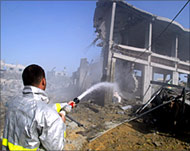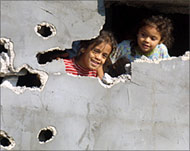Quraya blasts ‘unacceptable’ air raids
Palestinian Prime Minister Ahmad Quraya has said Monday’s airstrikes by the Israeli military in the Gaza Strip are undermining attempts to agree a mutual ceasefire.

“Such aggression as we have seen in Gaza today is not acceptable and will not help us as a government to achieve a mutual ceasefire,” Quraya said after a meeting of his emergency government.
At least 10 Palestinians were killed and scores wounded in five separate Israeli airstrikes on civilian neighbourhoods in the Gaza Strip on Monday.
Hamas warning
Armed resistance group Hamas, which lost two members in Monday’s attacks, vowed to carry out a “stinging” retaliation against Israel.
The attacks followed the fatal shooting of three Israeli soldiers by Palestinian gunmen on Sunday evening in the occupied West Bank.
Quraya has made the securing of a mutual ceasefire the top priority of his new government, but efforts to persuade Israel to agree to such a truce have fallen on stony ground so far.
“We have received no official Israeli reaction (to the ceasefire proposal),” Quraya acknowledged.
Israel has said it will not regard Quraya as a partner in the peace process until he shows he is prepared to act against resistance groups such as Hamas and Islamic Jihad, both targeted in Monday’s attacks.
Israeli Defence Minister, Shaul Mofaz, told Sunday’s weekly cabinet meeting that Palestinian leader Yasir Arafat, who appointed Quraya as premier, “continues to prove that he is a serious impediment to the development of a regime that could enter into talks with Israel”.
Election hopes
 |
|
Twelve Palestinians wounded when missile missed target in Gaza |
Quraya also said on Monday that his government wanted to organise general elections in the West Bank and Gaza Strip in June 2004.
“One of the most important questions for our government concerns elections which will take place in June 2004,” Quraya told a press conference after a meeting of his emergency cabinet.
He said his government would act to hold presidential, parliamentary and municipal elections.
However, Quraya could face the same problems encountered by the Palestinian Authority the last time it announced plans to hold elections.
Under huge pressure from the international community, Arafat issued a decree in September 2002 promising presidential and legislative elections in January 2003.
But since the summer of 2002, the Israeli army has reoccupied nearly all the West Bank, which is now dotted with checkpoints severely restricting movement of Palestinians.
Quraya’s announcement seems to imply he is banking on a speedy withdrawal of Israeli troops to the positions they held before the Palestinian uprising, or intifada, broke out in September 2000.
Arab League slams Israel
Meanwhile, the Cairo-based Arab League is to hold an emergency meeting on Tuesday to discuss the escalation of “barbaric Israeli aggression” against the Palestinians, said the Palestinian delegate to the 22-member body, Muhammad Subaih.
The session requested by the Palestinian delegation will discuss “Palestinian memorandum on the latest developments of barbaric Israeli aggresion notably against Rafah and Jenin,” Subaih told reporters on Monday.
 |
|
Over 1500 left homeless in Rafah, their houses demolished |
To date, 14 Palestinians have been killed in an Israeli military operation in the border town of Rafah in the southern Gaza Strip, to destroy tunnels that Israel claims are used by resistance fighters to smuggle arms from Egypt.
Cairo and Palestinian officials have said Israel only aims to create a wider buffer zone on its border.
Israel has also imposed a strict curfew on the northern West Bank city of Jenin and its neighbouring refugee camp since a woman bomber from the town blew herself up in Haifa on 4 October, killing 21 people.
Tuesday’s meeting will also look into the possibility of “calling on the UN General Assembly to demand the International Criminal Court to clarify the law concerning Israel’s construction of a wall in the Palestinian territories,” Subaih added.
The UN General Assembly is to hold a special session on the apartheid wall on Monday after the United States this week vetoed a resolution condemning it at the UN Security Council.
Palestinians see construction of the wall, which cuts at several places deep into the West Bank, as an attempt to fix the boundaries of any future two-state settlement.
Israel, however, insists it is trying to stop Palestinian fighters from crossing into its territory to carry out attacks.